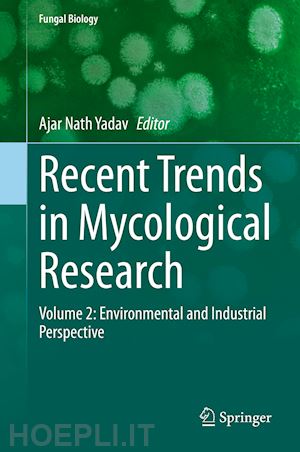Ajar Nath Yadav is an Assistant Professor (Senior Scale) in Department of Biotechnology, Dr. Khem Singh Gill Akal College of Agriculture, Eternal University, Baru Sahib, Himachal Pradesh, India. He has 5 years of teaching and 11 years of research experiences in the field of Microbial Biotechnology, Microbial Diversity, and Plant-Microbe-Interactions. Dr. Yadav obtained doctorate in Microbial Biotechnology, jointly from ICAR-Indian Agricultural research Institute (IARI), New Delhi and Birla Institute of Technology, Mesra, Ranchi, India; M.Sc. (Biotechnology) from Bundelkhand University and B.Sc. (CBZ) from the University of Allahabad, India. Dr. Yadav has 297 publications, with
h-index of 42,
i10-index of 96, and 4238 citations (Google Scholar).
Dr. Yadav is editor of 11 Springer-Nature, 05 CRC Press Taylor & Francis and 02 Elsevier books. Dr. Yadav has got 12 Best Paper Presentation Awards, and 01 Young Scientist Award (NASI-Swarna JayantiPurskar). Dr. Yadav received “Outstanding Teacher Award” in 6
th Annual Convocation 2018 by Eternal University, Baru Sahib, Himachal Pradesh. Dr. Yadav has a long-standing interest in teaching at the UG, PG and PhD level and is involved in taking courses in microbiology, and microbial biotechnology. Dr. Yadav is currently handling two projects one funded by Department of Environments, Science & Technology (DEST), Shimla and one by HP Council for Science, Technology & Environment (HIMCOSTE). Dr. Yadav has guided 01 Ph.D. and 01 M.Sc. Scholar and presently he is guiding 05 scholars for PhD degree. In his credit ~6700 microbes (Archaea, bacteria and fungi) isolated from diverse sources and ~550 potential and efficient microbes deposited at culture collection ICAR-National Bureau of Agriculturally Important Microorganisms (NBAIM), Mau, Uttar Pradesh, India. He has deposited
2423 nucleotide sequences and
03 whole genome sequences (
Bacillus thuringiensis AKS47,
Arthrobacter agilis L77 and
Halolamina pelagica CDK2) and
02 transcriptome to NCBI GenBank databases: in public domain. The niche-specific microbes from extreme environments were reported as specific bio-inoculants (Biofertilizers) for crops growing in normal and diverse abiotic stress conditions. Dr. Yadav and group have developed technology for screening of archaea for phosphorus solubilization for the first time. He has been serving as an editor/editorial board member and reviewer for different national and international peer-reviewed journals. He has lifetime membership of Association of Microbiologist in India, and Indian Science Congress Council, India.











